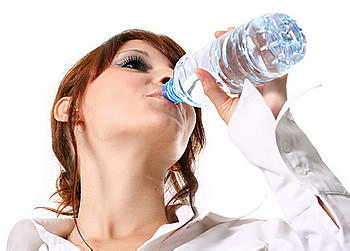Water and weight loss. Dehydration

The body’s need for water takes second place after the need for oxygen!
Water regulates temperature and body weight, carries nutrients to cells, removes decay products from the body and performs many different functions. Almost all life processes in the body occur with the participation of water.
The body’s need for water:
- At least 1.5 – 2 liters per day for normal functioning.
- Active weight loss requires an increase in the rate of water consumption per day (30 ml of water per kilogram).
- Additionally, for each hour of physical activity, you need 1-3 glasses of water.
- In hot and cold weather, more water is required to regulate water balance and body temperature.
- When vitamins, minerals, and other food additives are added to the diet, water consumption must be increased so that the resulting nutrients are fully absorbed by the body.
- With an increase in protein in your diet, the need for water also increases.
The role of water in weight loss
- Does not contain calories, fat, and cholesterol, it is low in sodium
- Reduces appetite
- Helps to cleanse the body
- Helps the body process fat stores
The Secret to Always Forgotten Weight Loss: Dehydration and Metabolism.
People know about it or not, but when they try to lose weight (fat), their main goal (especially in the long term weight control) should be to increase their metabolism (the speed with which your body converts energy). But most people are not aware that their level of hydration directly affects their metabolism. Water is involved in almost all biological functions in the human body, so when your body is dehydrated, your metabolism slows down. When your body does not get enough water, your calorie (muscle) burning machine slows dramatically. More than 70% of your muscles are made up of water, so if they do not fully get enough water, this interferes with their ability to generate energy. Another important factor is the body’s ability to use fat as fuel, but when the body is dehydrated, this function is also limited. The combination of these two factors affects your metabolic rate. The list of negative side effects that affect your metabolism due to dehydration can go on indefinitely.
The effect of dehydration on the metabolism in your body is often overlooked by many weight loss programs, when in fact this should be one of the priorities of any healthy eating plan . The bottom line is that taking enough water is the first step in ensuring your metabolic rate is optimal. You should drink at least 2 liters of water every day, preferably about 3 liters (and in summer this norm is more than 30%). Your body may not distinguish hunger from thirst, therefore, when your tummy begins to growl, you mistakenly think that he is hungry, although in fact, he can just tell you that he needs water. First, drink a large glass of water, and if after 15 minutes you feel that you are still hungry, then eat something (healthy). If you think you need to drink when your mouth is dry, then I will tell you that as soon as your mouth becomes dry and you feel thirsty, your body is already dehydrated! This is often accompanied by a lethargic state.
There is also a separate interesting article about the “Importance of hydration in sports. ” Read it cost and people who are not involved in sports.
Get a good habit – drink water!
The first symptom of dehydration is constant fatigue. If the body is chronically short of its moisture dose, toxins accumulate in it, immunity decreases, metabolism, and digestion are impaired. Drink water gradually throughout the day. Do not drink a lot of water at one time, as it will pass through your body in transit without bringing the expected benefits. Drink water evenly throughout the day.
Your “water menu”
- A glass of water immediately after the morning rise helps to cleanse the body.
- An hour and an hour after each meal.
- Evenly for 1-2 sips throughout the day.
To make it easier to control fluid intake, use one and a half or two-liter bottles – this is how you visualize your water regime. Drink water slightly chilled – so it is better absorbed by the body.
Don’t like to drink plain water?
Fruit and vegetable juices, soda, black tea, coffee, and alcohol do not replace water. On the contrary, water is required for their assimilation. If you do not like to drink plain water, drink specialized teas and drinks that help maintain the body’s water balance.